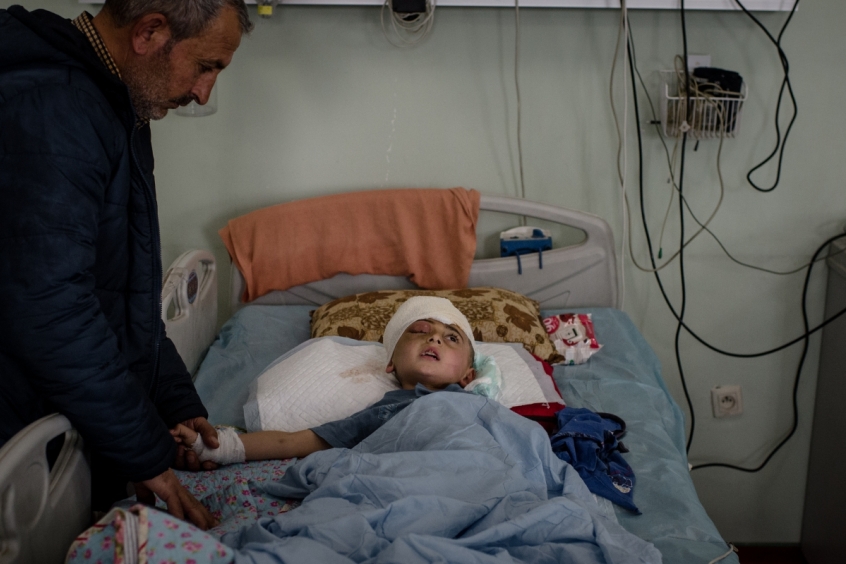With all the headlines Islamic State is still capable of generating, it is nevertheless in the end-game of its dream of an Islamic caliphate. Coalition forces are attacking its Iraq base in Mosul, and the streams of refugees and slow recapture of its territory and telling a story of defeat. But the human cost is horrifying – and rising.
Why does Mosul matter?
The city has huge symbolic and strategic value. Mosul is the headquarters of Islamic State in Iraq and its fall to no more than 1,500 IS fighters in June 2014 heralded the growth of the organisation to control vast swathes of terrority. It was in the city's Great Mosque that IS leader Abu Bakr al-Baghdadi declared the so-called 'caliphate', an Islamically-governed region spanning Iraq and Syria. It was previously a diverse city of 2.5 million people; its large Christian population was all driven out by IS. Recapturing it would represent a decisive blow against IS, whose last major stronghold in the country it is, though terrorist activity is expected to continue.
Why did it fall so easily?
Iraq's armed forces were corrupt and incompetent, but a key factor was the deep division between the country's Shia governing class and its largely Sunni population. IS represented the Sunnis, though in the most extreme form, and had a good deal of local support.
What was life like there?
IS imposed its fundamentalist ideology on the city and its inhabitants. In a church liberated by Iraqi government forces a list of 14 rules of behaviour has been found scrawled on the walls: these include penalties for drinking and smoking, a prohibition on women leaving the house if it is not necessary and the death penalty for blasphemy. In recent weeks the danger and privation has been extreme.
What's happening now?
After a long period of preparation, a retrained and revitalised Iraqi army supported by US-led air power and around 1,000 US troops is retaking the city. It has already taken the eastern half, but the battle for the western half is much harder. It's the older part of Mosul, with narrow streets and alleys unsuitable for armoured vehicles, and IS has had a long time to prepare the ground. Furthermore, IS continues to use civilians as hostages; the coalition forces are extremely reluctant to press attacks home if it means substantial civilian casualties.
Are civilians being injured?
Yes, all the time. Monitoring group Airwars suggests there may have been up to 1,000 deaths from airstrikes in March alone. But a blast on March 17 has been particularly controversial, with some eyewitnesses claimed a US-led airstrike hit buildings that collapsed, killing up to 200 people. However, the Iraqi military says there was no sign of an airstrike and that it was an IS bomb. IS is also accused of using chemical weapons.
Why aren't the civilians leaving?
Many are, though IS fighters shoot them if they see them going. There has been a huge exodus of refugees, now amounting to 433,000. The UN says that a total of 1.5 million could leave their homes in the face of the advancing battle. There is already cholera in IS-controlled Western Mosul and reports of widespread hunger. Among the Christian organisations working in the region are Tearfund, World Vision and Samaritans' Purse.
Another is IHP, a medical aid charity that provides donated medicines to refugees and displaced people, including in Erbil where many refugees from Mosul are living.

What will happen next?
IS will be defeated in Mosul, but the fear is that the cost to civilians will be tragically high. Furthermore, there are questions about how the city – and Iraq in general – will recover. Billions of dollars worth of damage has been caused, but also the region's ancient communities – including the Christian community – have been shattered, with some predicting many of the exiles will never return. There are continuing fears about security, with many heavily-armed militia groups reluctant to give up their weapons. And regional players like Turkey and Iran are making it even more difficult for the Iraqi government to restore anything like stability. There are still questions about whether Iraq can even survive as a unified state, with many in Kurdistan expecting independence. The divisions within the country, not least between Shias and Sunnis, mean that even after Mosul's recapture, Iraq may still be a long way from peace.













